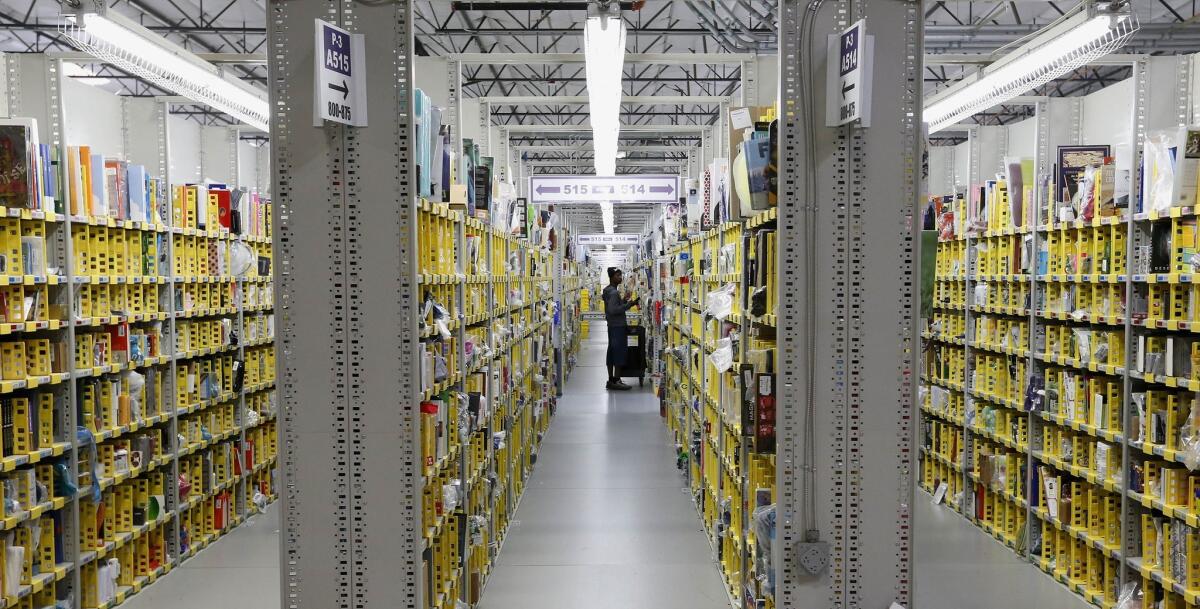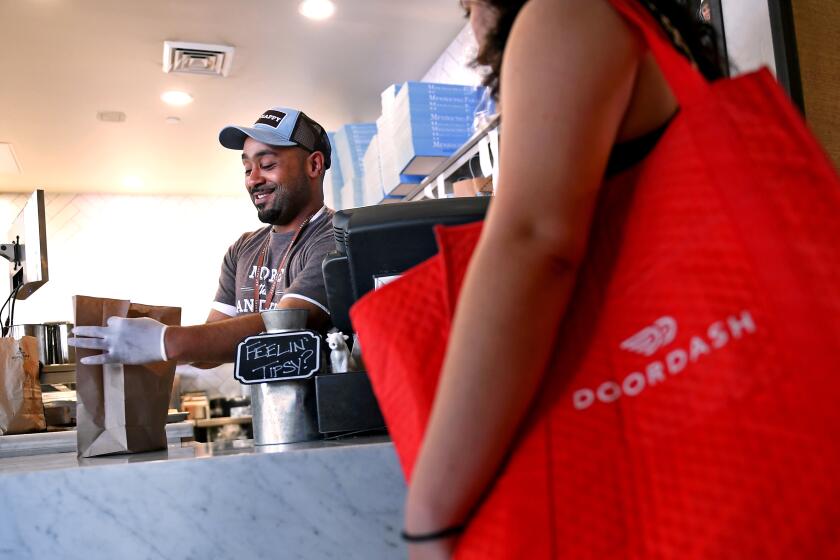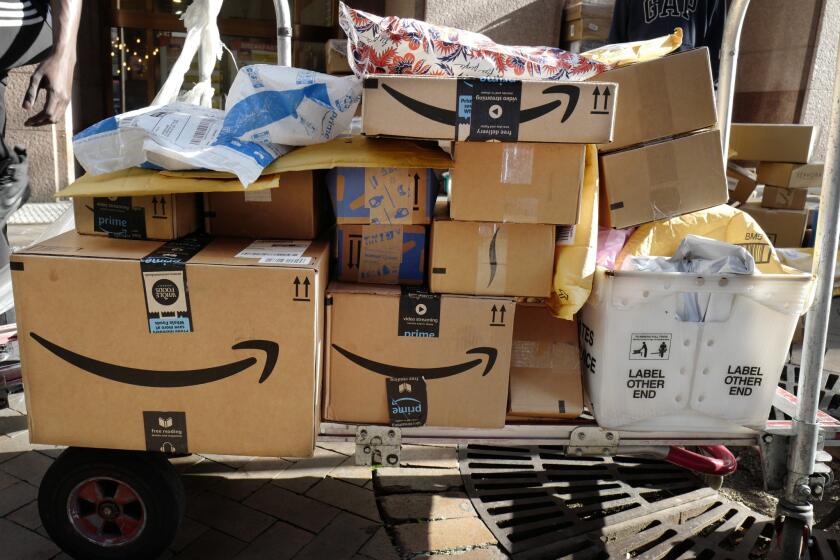Amazon drivers say they received a single wipe to clean vans before a shift
- Share via
When about two dozen Amazon.com Inc. delivery drivers reported for their shifts Tuesday morning on California’s Central Coast, their manager passed around a sleeve of disinfecting wipes. He said they could each take only one to clean their vans before starting their routes, according to three people present.
The drivers, who work for a company that has a delivery contract with Amazon, thought it was a joke at first. Upon realizing it wasn’t, they got busy figuring out how to use a tiny wipe to clean a van shared with other drivers and packed with boxes touched by untold others. One driver furiously scrubbed her scanner since she touches it frequently. Another wiped down his steering wheel and door handle.
“I felt so disposable,” said one of the drivers, who, like the others, requested anonymity for fear of losing her job. “We’re really worried, and one wipe for a van just doesn’t cut it.”
Around the country, drivers who deliver Amazon packages are providing a valuable public service by bringing household essentials to homes and helping consumers avoid stores, potentially minimizing the spread of the coronavirus that has infected at least 7,000 people in the United States and killed more than 100. Yet some of these drivers harbor fear and resentment since they see friends and family members urged to stay at home while they are being told to crisscross town at their own peril.
People who make their living through on-demand platforms face the possibility of a recession aggravated by a drop in demand caused by coronavirus fears.
The coronavirus outbreak poses a challenge of unprecedented severity for Amazon — and it’s hardly the only company grappling with a pandemic that has upended the daily lives of people around the world.
The company has announced plans to hire 100,000 people and issue temporary raises to help keep groceries and other essentials flowing. It has set up a $25-million relief fund to pay delivery workers for up to two weeks if they get sick with the virus or miss work due to quarantines. Amazon is offering a temporary $2 hourly pay bump that for most of them will total about $500 over six weeks in hazard pay.
Amazon on Tuesday told suppliers that it would stop accepting shipments of nonessential goods in its warehouses, an effort to keep things such as food and cleaning supplies moving through the system.
Some of this will almost certainly help. But Amazon, already trying to keep up with a surge in online orders, depends on the willingness of tens of thousands of contract drivers to show up each day. The company uses United Parcel Service Inc., the U.S. Postal Service and other companies for about half of its deliveries worldwide and in a crisis could likely increase its reliance on the big carriers. But it has the most direct control over its own network of independent drivers who shuttle around in dark blue vans emblazoned with the Amazon smile.
Depending on the role, delivery couriers are exposed more often to diseases or infections over the course of their job than most other job types, according to Department of Labor data tracking worker behavior. If enough Amazon drivers get sick, or simply worry about the risk enough to stay home, the Seattle-based company’s logistics machine could struggle to meet its commitments to shoppers.
Not all the 12 drivers interviewed for this article were overly concerned about their safety. One in South Bend, Ind., where there have been few confirmed coronavirus cases, said the pandemic hasn’t changed how he does the job at all. He made one delivery to a nursing home, and the front desk clerk wiped the package with a disinfecting wipe, but other than that, it’s been business as usual, he said.
“My warehouse manager and logistics manager have been keeping a hand sanitizer station where we all check in and encouraging people to use it,” he said. “There is little risk to me honestly. There aren’t any community spread patients yet in my area, so I definitely wouldn’t be staying home until that occurs.”
It’s also true that some jobs — a grocery clerk, say or an Uber driver — are potentially more exposed to the virus. But several of the other Amazon drivers Bloomberg interviewed worry when customers greet them at doorsteps and in office buildings and are concerned about all of the people who touched boxes and envelopes before they did.

One driver noted that when delivering alcohol, he is required to get close enough to customers to request their identification. Some are taking their own precautions — one driver in Chicago wears a N95 mask and uses hand sanitizer after every pickup.
The challenge Amazon faces in keeping its frontline workers healthy and willing to work has already become apparent in its warehouses. After a handful of COVID-19 cases were reported in at least three Amazon depots in Europe, unions there this week called for the company to cut shifts and close the facilities for cleaning. At Amazon’s main logistics hub in Italy, where two workers were diagnosed with the disease, absenteeism has hit 30% in recent weeks, people familiar with the matter have told Bloomberg.
“The health and safety of our employees and contractors around the world continues to be our top priority,” an Amazon spokesperson said in an email. “As communities around the world are requiring social distancing, we’re seeing that our teams — much like grocery stores, pharmacies and other essential services — have a unique role getting customers the critical items they need and this is especially vital for the elderly, people with underlying health issues, and those sick or quarantined. We have implemented a series of preventative health measures for employees, delivery and transportation partners at our sites around the world.”
Amazon typically focuses on moving packages as quickly as possible at the lowest cost. But the outbreak requires the company to slow things down and give specific safety instructions to each employee, said Barbara Hoopes, a business professor and logistics expert at Virginia Tech. Even independent contractors in their own vehicles should get instructions specifically tailored to their roles and a kit with hand sanitizer, disinfecting wipes and any other equipment needed to improve their safety, she said.
“This is the type of business that we want to continue to operate since supply chain is critical for a functioning economy, but the workers are more at risk,” Hoopes said. “Amazon can be a leader in giving employees and contractors instructions on what to do.”
Some of the drivers interviewed for this story say that isn’t happening. They’re receiving generic advice about washing their hands and staying home if they are having symptoms, but no specific instructions regarding their jobs or how to minimize their risk of exposure. Instead, they describe a haphazard operation where safety takes a back seat to the swift delivery of toilet paper, food and cough medications.
Much of what happens with Amazon deliveries is beyond the company’s direct control. It utilizes independent contractors driving their own vehicles to deliver packages as well as employees of separate companies that operate as Amazon delivery partners. So a lot of the people delivering Amazon packages aren’t Amazon employees at all.
A surge of online orders due to the coronavirus pandemic is slowing quick deliveries from Amazon, Walmart and other retailers.
The California drivers instructed to wipe down their vans with a single disinfecting wipe work for one of the delivery service partners, which have been urged by Amazon to take on more routes to meet demand through the crisis. They say they have instructions to wipe down vans multiple times during each shift, but that their employers aren’t providing them with the supplies they need. Some drivers say they have no disinfecting wipes at all. Another driver said his company had only 10 pair of protective gloves one day for about 30 drivers reporting for their shifts.
“No one wants to be put in this situation,” said an Amazon delivery driver in Richmond, Va. “It’s not fair, but what am I going to do? I have bills to pay.”
One driver in Texas supports an elderly mother and two sons, one with a compromised immune system. She goes to work each day to support her family, but fears putting them at risk if she brings illness home. She’s hopeful the raises Amazon announced will be paid to drivers such as her — her employer hasn’t yet made that clear — but worries about the toll that additional hours will take on her immune system since managers are asking drivers to work six days each week.
“I’m not even sure I could find another job right now if I decided the risk was too great,” she said. “My mother and son are in a high-risk group so you would think it would make the decision easy, but it’s not, not when my children depend on me.”
One driver in Boston stopped making deliveries about two weeks ago due to concerns about the virus. She has a full-time job and drives for Amazon on the side in her own car for extra money. She’s worried about other drivers who can’t afford to give it up, even if they are feeling ill. Still, she said she’d take the risk out of financial necessity if the economy melts down and she loses her full-time job.
“Anyone with a shred of common sense knows you shouldn’t be going to some stranger’s door to deliver groceries right now,” she said. “This system is set up to take care of Amazon’s customers. It’s not set up to take care of drivers.”
Another driver in California is worried about his safety but feels good when customers thank him for making deliveries so they can stay safe at home. Some of them seem lonely and eager to chat since they are stuck in their own homes, but he tries to keep the conversations brief and not let people get too close.
“I try to get the door as quickly as I can and get away before they see me,” he said. “They try to make conversation and I just try to keep my distance when they do.”
More to Read
Inside the business of entertainment
The Wide Shot brings you news, analysis and insights on everything from streaming wars to production — and what it all means for the future.
You may occasionally receive promotional content from the Los Angeles Times.












